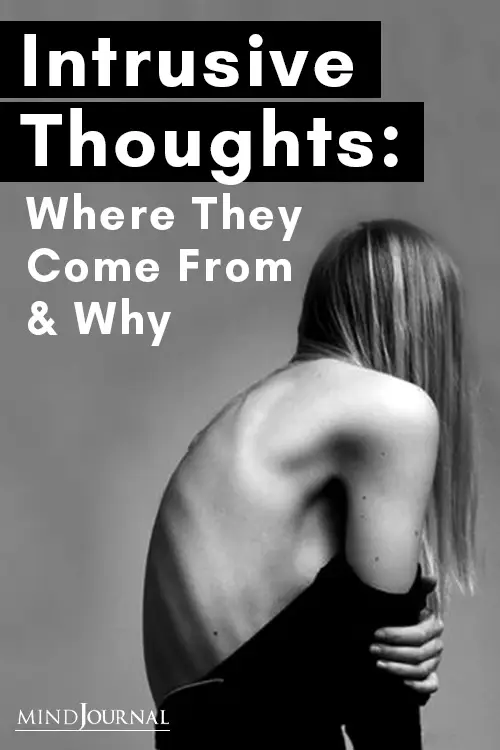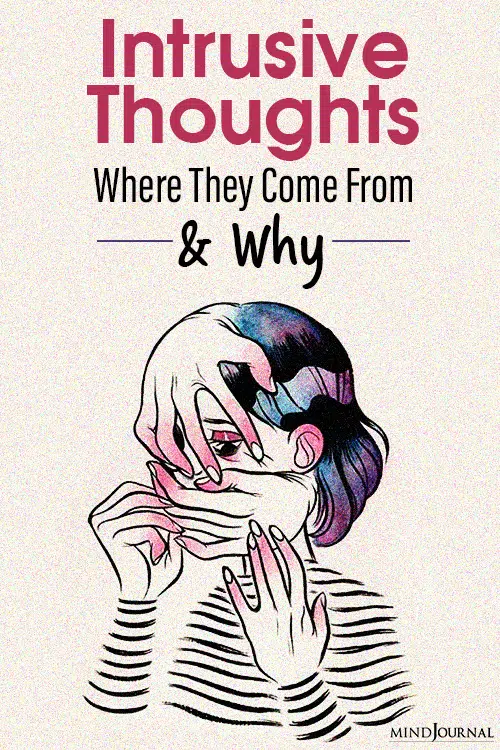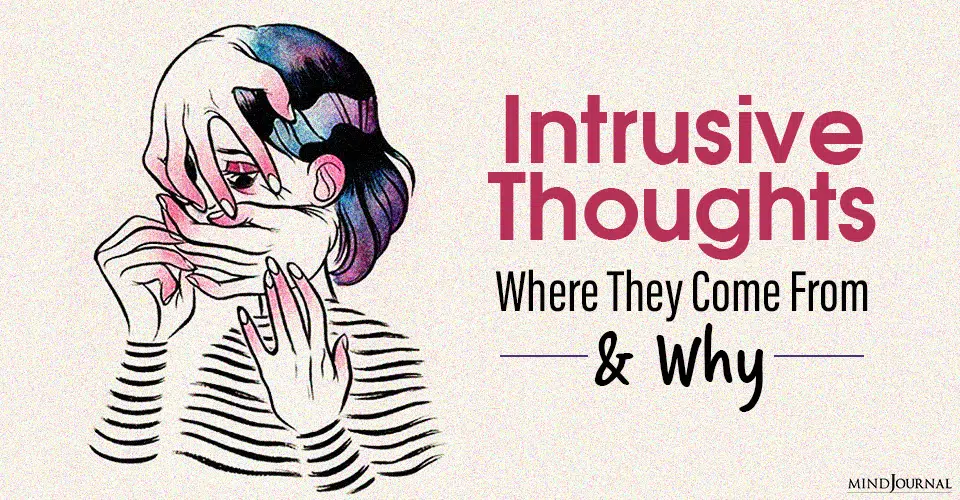Have you ever had intrusive thoughts, that have threatened to interfere with your daily life, and which never fail to make you think that you are going crazy?
The origin of unwanted, intrusive thoughts may be underlying anxiety. Unconscious anxiety, the type that one is not aware of, frequently bubbles up to the surface and takes shape as a dark thought. These thoughts are often frightening and startling. A person may berate himself or herself and worry that having an intrusive thought means he or she is “crazy.”
Yet, this is not the case, and admonishing oneself may cause additional anxiety. The unconscious anxiety is then compounded with conscious anxiety and the intrusive thoughts may increase.
For example, say a young woman, Anne, is driving to a friend’s lake house. She is enjoying the ride, singing, laughing, and chatting with her friends who are also in the car. Suddenly, as she is driving, Anne has an intrusive thought: “What if I drive off the road, and hit that big oak tree?” She shudders and shames herself for such a thought. She questions her sanity.
Yet, she has zero intention of acting on the thought. Despite this awareness, Anne continues to beat herself up for the thought and her anxiety intensifies. She withdraws and finds an excuse to return home without her friends. The intrusive thoughts escalate and Anne feels alone and desperate.
Alternatively, let’s say Anne reflects on the thought instead of berating herself. Examining the feelings that are possibly driving the thought, she realizes she is intensely conflicted about whether she is a good person. This worry has consumed her for a while, Anne decides it is a good time to initiate therapy.
Related: What You Need To Know About Intrusive Thoughts
In therapy, she explains both the intrusive thoughts and her intense worry that she is a “bad person.” Her therapist empathizes and assists her in unpacking these thoughts and feelings. When the therapist asks about her relationship with her parents, Anne states, “My parents were not great at handling feelings.” At the end of the session, the therapist asks Anne to be aware of any associations she may have to her childhood.
During the next session, Anne shares a childhood memory. She remembers a friend who showed her adult material when she was very young. The shock and shame she experienced were extreme. Worried about getting in trouble, she kept the incident to herself. Eventually, she shared the traumatizing experience with her mom, who scolded and punished Anne in place of helping Anne recover from the experience. Grounded for a week, Anne suffered intense distress. Unfortunately, the experience with her mother reinforced the idea that Anne should hide her feelings.
Feelings are an essential component of being human, and nothing to be ashamed of. It’s behaviors that may get a person into hot water. Embracing a negative feeling in an attempt to gain a better understanding of oneself, may prevent a person from acting on the feeling inappropriately or unsafely.
Accepting and examining the experience of negative emotions may illuminate unconscious conflict and decrease the chance of anxiety bubbling up to the surface in the form of an intrusive thought. Instead of ignoring or hiding emotions, identifying and understanding them may allow a person to quiet anxiety.
For example, say Lisa feels intense jealousy because her friend, Suzie, made the soccer team and Lisa did not. Instead of beating herself up for feeling jealous, Lisa may try and embrace it. It is not unusual for a person to be hurt when witnessing a friend succeed when he or she did not. This is understandable and human. After recognizing, identifying, and processing the envious emotion, Lisa may be able to find inspiration to develop her own skillset. Alternatively, if Lisa punishes herself for having a negative feeling, her sad and hurt feelings may intensify, resulting in less passion to improve.
Another example includes a man, Dan, who is extremely worried about a colleague who seems to be manipulative. The colleague appears to be intent on undermining him. Dan hides his worries and continues to work diligently on his project. Yet, in several consecutive meetings, the colleague spouts backhanded comments and claims credit for Dan’s ideas. After a few months, Dan begins to have bizarre thoughts in the elevator. “The elevator shaft is going to break and everybody in the elevator is going to plunge to their death.” He realizes the intrusive thoughts are dark and fears that he is “losing it” as his colleague implies.
However, if Dan recognizes, identifies, and verbalizes his worries about the colleague, he may receive the support necessary to cope with the situation and find peace. Insight into painful childhood experiences with a father who operated like Dan’s co-worker may unveil unconscious anxiety.
Unconsciously, the present situation may feel like a repetition or reinforcement of the original trauma with Dan’s father, which compounds the anxiety. Using knowledge about his past to inform the present, Dan is able to process the experiences and alleviate anxiety.
A person who embraces a negative feeling state, instead of ushering it out of his or her head, is also able to verbalize the feelings to elicit support. Keeping feelings locked inside frequently causes depression and anxiety.
Related: Intrusive Thoughts and Feelings with High Anxiety
Telling an empathic person who attempts to understand the feeling and is able to convey this understanding with a statement like, “You are disappointed. I get it. You worked so hard and you feel like it was in vain. It’s disappointing.” The empathic statement allows the person to feel less alone in his or her plight because a friend understands. It also fosters closeness in the relationship because the friend “gets it.” After the empathy, it may be useful for the friend to provide reassurance, encouragement, or help with problem-solving.
It is important to note that a person who is tempted to act on extreme and violent thoughts may need immediate professional help. Yet, in less aggressive cases it may be helpful for a person to remember that feelings are rarely wrong. It is how a person acts on feelings that can be destructive. Understanding emotions assists a person in knowing himself or herself, garnering support, and keeping both unconscious and conscious anxiety at bay.
You can read Dr. Erin Leonard’s book “Emotional Terrorism, Breaking The Chains of A Toxic Relationship” to know more about this, and you can get it here. She has several other books to her credit, and you can check them out here.
Written By Erin Leonard Originally Appeared In Psychology Today










Leave a Reply
You must be logged in to post a comment.